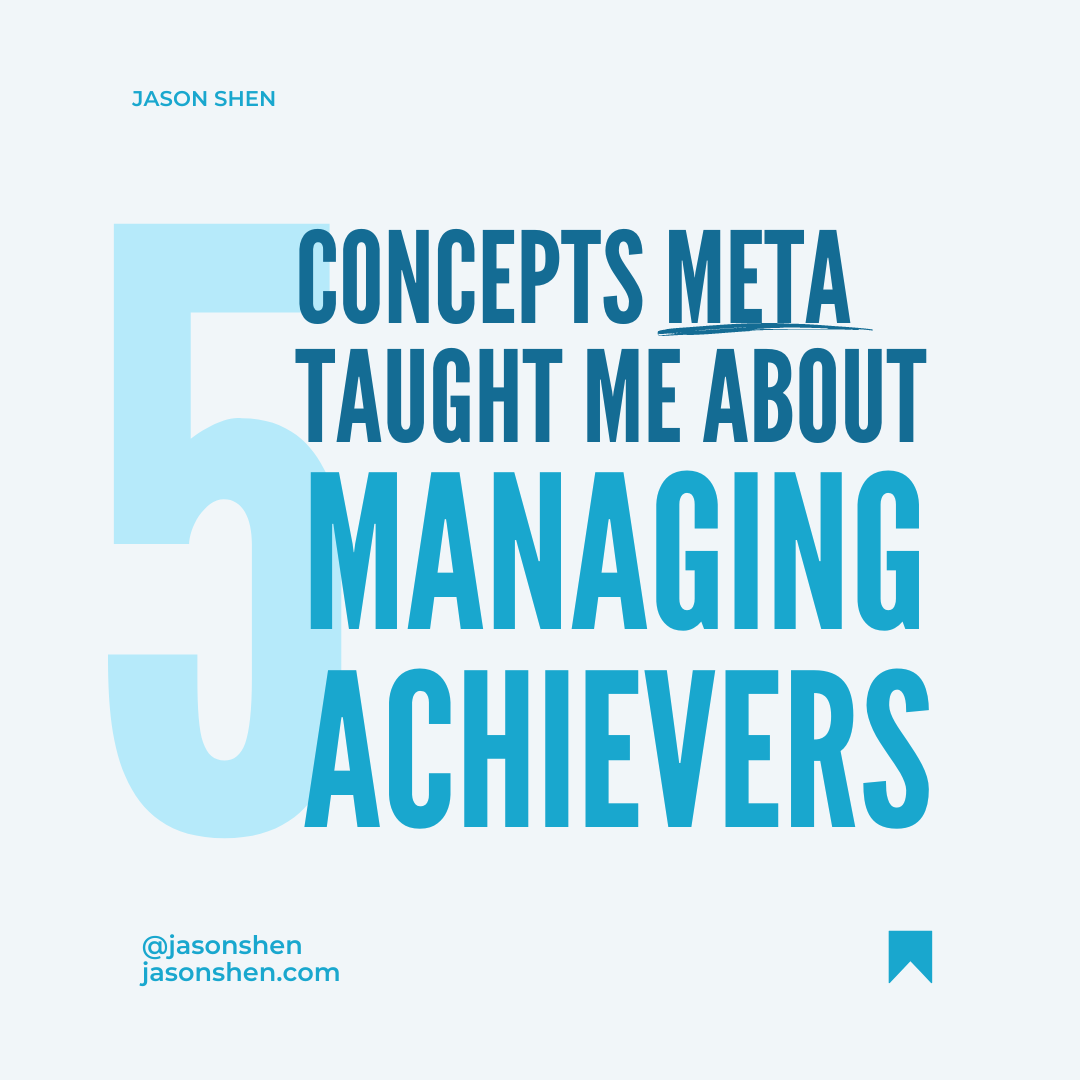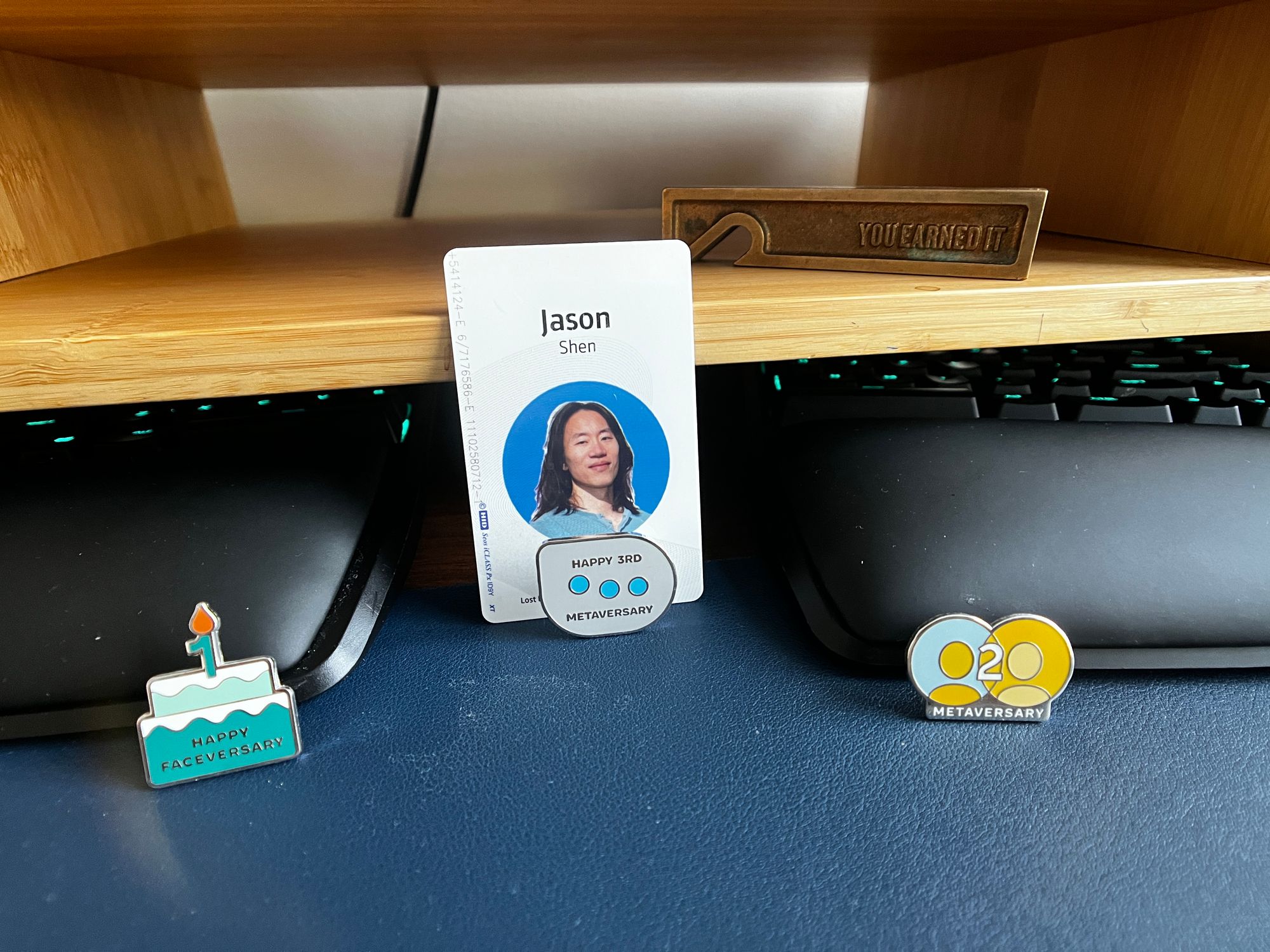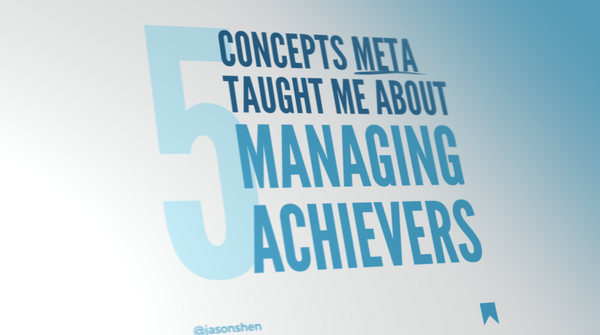Babies are cute AF. I got to spend some time with a few close friends as I round out my second full week of sabbatical, two of whom recently brought a little boy into this world. And the fat cheeks and spontaneous smiles were almost too much.
I'm looking forward to parenthood and while there's so much more to raising another human than giggles and peekaboo, it's a nice reminder in an increasingly less fertile world that kids have big pluses too.
Please enjoy this week's exploration of farewells, opportunities, ai, and another set of lessons from Meta (2 of 6—see Part 1: Metrics)
—Jason

What's on deck this week:
- 📣 Saying Goodbye: An Interintellect Salon
- ⚡️ Don't Let New Opportunities Sit on the Shelf
- 👁️ Turning Crumpled Paper into Architecture
- ⚙️ Meta Lessons: Managing Achievers
📣 Saying Goodbye: An Interintellect Salon
I've been slowly announcing my exit from Meta on different platforms: here on this newsletter (y'all heard it first!), then Facebook, then LinkedIn. And of course in the weeks leading up to my departure I slowly let folks know and created opportunities to connect / stay connected.
I realized there's an art to saying goodbye and that a lot of people are probably thinking about this right now. Either because they had to leave abruptly (via layoff / RIF, which happened to me at Etsy) or by choice (as in my most recent departure). So I'm inviting you to join me in a conversation about it:
The Art of Farewell: Saying Goodbye at Work
$15—Wednesday July 12th noon Eastern (9am Pacific, 5pm GMT+1)

⚡️ Don't Let New Opportunities Sit on the Shelf

Building on a recent Twitter thread of mine, I realized I often find myself slow to respond to emails & DMs that represent great opportunities—a new client, a speaking opportunity, a unique chance to collaborate.
This bothers me as because on the surface this pattern is “irrational”—a quick response would increase chances of that opportunity getting realized.
But I think I realized why: Once I respond to the message, I may discover complications or make a mistake that ruins the opportunity.
If I leave the message in my inbox, it stays perfect. It’s like keeping a gift wrapped in its packaging: looks pretty but that’s not the point. Gifts unwrapped & put into use creates more value to my life than staying pretty on the shelf.
Similarly I must respond more quickly to these great opportunities Because imperfect conversations about a collaboration creates more value than perfect msg’s in my inbox.
👁️ Turning Crumpled Paper into Architecture

Generative AI continues to provide strange, unexpected and marvelous creations. Here we have a crumpled piece of paper reimagined as artful buildings by legendary architects. At least I just assume they are legendary, only one I actually recognize is Gehry.
zaha hadid architects trained a generative model that renders architectural designs in the style of renowned architects ... from randomly crumpled pieces of paper.
— Siqi Chen (@blader) June 19, 2023
this one is in the style of frank gehry:
🧵👇 pic.twitter.com/tS0uKMaAmC
⚙️ Meta Lessons: Managing High Achievers
Continuing the thread from a few weeks ago on lessons learned from Meta (1: Metrics), I've got another one on managing high achievers. I only formally managed a business intern, but I had access to the private Managers FYI group on Workplace, worked with 7 engineering managers (who all had formal reports) and had 5 different managers myself, so I feel I have some insight on the matter.

- 📋 Expectations—in tandem with the focus on Impact™️ at Meta is the idea of role & level expectations. Every job title at Meta comes with a corresponding set of expectations what that person should be doing at a given level. This then allows managers to indicate to their reports whether they are meeting some (MS) / most (MM) / all (MA) / (greatly) exceeding (EE/GE) or redefining (RE) expectations.
- 📊 Calibrations—to reward high performance without too much nepotism, Meta uses a complex rating system where managers do 1:1 "mashups" comparing the write-ups and provisional ratings of their reports before participating in a large group "calibrations" where every rating and promotion packet is carefully scrutinized and debated to ensure a consistent bar. Managers hated the time suck but it was the an effective way of fairly distributing ratings at scale.
- 💖 Show Care—The People team at Meta once ran a large scale study of the key behaviors of successful managers and found "Show Care" was a key behavior—it became a part of how managers were evaluated. Even if some managers showed care in a performative manner, this focus balanced well with the emphasis on Impact™️ to create culture of psychological safety that many other workplaces lack.
- 📝 HPMs—short for Highlights, Progress, Me, HPM's was shorthand for a weekly update that most non-engineering functions would post on Workplace to cover their ass / let their partners know what was up. By sharing priorities for the week, upcoming PTO, links to recently completed or inflight work, and the general sharing of life outside of work (trips, hobbies, family, etc), one could get a sense of what someone was working on just by scrolling through their HPM's.
- 🤝 Alignment—at Meta, the nice way of saying "I disagree" or "I am against X" was "we aren't aligned on this". Decision making was often a bottoms-up effort of building alignment (a stronger version of consensus) among various stakeholders and then bringing the decision to a senior leader to sign off. But if two groups had a hard misalignment, then an escalation was sometimes necessary.
Recent Issues






